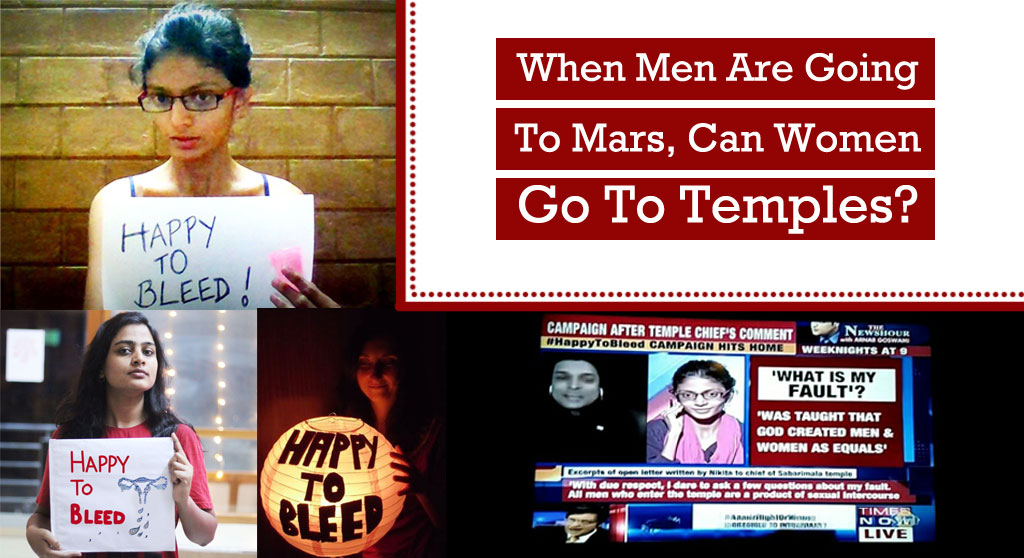When Men Are Going To Mars, Can Women Go To Temples?
Just as I was about to leave home from work yesterday, a phone call from a friend changed the course of my evening. In an hour, I was at the Times of India building on MG Road, Bengaluru, waiting for the 8 o’ clock news discussion to be aired live on Times Now. Being the first respondent to the #HappyToBleed campaign, I was glad to be in conversation with one of the self-appointed torchbearers of the nebulous, terra infirma of ‘Indian culture’.
Two nights before, as I sat in my pajamas and tank top, finishing work, I came across Nikita Azad’s event for #HappyToBleed on my Facebook newsfeed. As someone who has always been hotheaded about menstrual taboos and regulations and more importantly, as someone who currently works with adolescent girls in the areas of menstrual and reproductive health, this was something that piqued my curiosity.
Rousing my sleepy self, I extricated the menstrual cup from the depths of my vagina, turned up the brightness on my laptop camera, tousled my hair and took a picture with ‘HappyTo Bleed’ sprawled across the page, with my menstrual cup well within the view. I sent the picture to Countercurrents.org and Feminism in India, both of whom were the first supporters of the cause. This very picture went viral within a day, and Menstrupedia’s co-founder, Aditi Gupta pitched right in with her brilliant, hard-hitting photo story.
Lights. Camera. Action. Enter Rahul Easwar, the grandson of the senior supreme priest of Sabarimala, on the panel. Easwar started the dialogue with a grandiose statement that he was happy to welcome questions from the ilk of protesting young women. Easwar employed his cloyingly masculine, oh-so-pro-women rhetoric time and again to evade answering, as the news anchor pointed out, every single question we posed.
Thank you Rahul Easwar, for being so benevolent. But we do not need your mercy-riddled gesture of “welcoming us” anymore.
[inlinetweet prefix=”” tweeter=”” suffix=””]Apparently, the point that Mr. Prayar Gopalakrishnan made about inventing scanners to detect menstruating women was “lost in translation”[/inlinetweet]; says Rahul Easwar that it does not sound ‘so offensive’ in Malayalam.
Dear Rahul Easwar, I am sure all my bleeding-raging sisters agree that this is not merely a case of linguistic misunderstanding.
What we pointed at is the larger tradition of shaming, policing and disciplining women for normal, natural bodily processes such as menstruation. And of course, [inlinetweet prefix=”” tweeter=”” suffix=””]Easwar says Mr. Gopalakrishnan’s comment was “just metaphoric.”[/inlinetweet] Right. I’ll let Rahul Easwar take a moment to reconsider his statement, while I go figure out the ramifications of a “metaphoric scanner” for menstruating women. Talking about scanners and ‘docile bodies’, my body is not for anyone to scour for dregs of “impurity”. The “impurity” Easwar and his brethren are referring to is in fact, nutrient-rich blood and tissue every human being thrives on in the womb.
As Easwar hemmed and hawed about Indian values and culture, and how this campaign is a “Western Feminist invention”, I took a moment to silently offer condolences to the death of Reason. Here was the London-educated (in Philosophy and Psychology of all the things, as his Wikipedia page helpfully pointed out) Mr. Easwar, dressed in his prim suit, talking eloquently in his honeyed English on live television about the fallouts of errr… Westernization.
The issue, Easwar emphasizes, is that the god at Sabarimala is celibate and that’s the reason women in the “fertile” age group are not allowed inside. Sensing the upcoming justification, I ask, “So, because I am merely an ‘object of desire’ (his words), am I expected to not be seen in the vicinity of a temple for the benefit of a celibate male god and his male devotees?” [inlinetweet prefix=”” tweeter=”” suffix=””]If I offend a celibate god merely by entering a temple, will I equally offend the omnipresent god if I bleed in my bathroom?[/inlinetweet]
Easwar answers that it is a complex nexus of things that are invovled in this equation… “blah, blah, blah… Western Feminism… blah, blah, purity…. blah… Indian… Blah…values… Purity of the soul…blah blah… Hinduism… Blah… South Indian Hinduism… blah…”
After beating around the bush, Rahul Easwar came to his point. Of course, it was only about “differentiation”, and not discrimination, like us common folk had understood it. Apparently, it was about men and women being complementary. [inlinetweet prefix=”” tweeter=”” suffix=””]And in fact, the ‘Sabari’ in Sabarimala is a woman![/inlinetweet]
Well, congratulations on that! Firstly, we can talk about men and women being complementary ONLY in a scenario where equal forces are at play. Enough has been spoken, written and argued about the sordid tale of gender equality in our country. Secondly, yes, it is commendable that ‘Sabari’ is a woman and you respect her, but the deeper problem is that you either glorify women as goddesses and worship them, or dehumanize them and treat them as second-class citizens. Where on earth is the middle-ground?
What we are asking is to take a relook at traditional practices simply because we have to cater to the needs of a constantly-evolving society. This is not an attempt vitriolized by Westernization, and especially “Western Feminism”. At the end of the conversation, [inlinetweet prefix=”” tweeter=”” suffix=””]Rahul Easwar generously offered to put me in touch with his feminist and activist friends at Sabarimala if I ever wanted to visit.[/inlinetweet] How gracious of such a renowned man to offer this to a puny, menstruating woman like me!
Dear Mr. Rahul Easwar,
I am as Indian as you are. I am as South-Indian as you are. Born and raised in a Hindu family. Don’t you tell me what South-Indian, Hindu culture is.
Maybe all we need is a crash course in human reproductive anatomy.
And before I wind up this hoo-haa (pun intended) about bleeding uteruses, am I still happy to bleed? Bloody yes. [inlinetweet prefix=”” tweeter=”” suffix=””]The world goes around because women bleed.[/inlinetweet]
Sharmada, a reclusive writer and poet, was born in Bengaluru and spent a large part of her childhood reading obscure writers and disconsolate tales. She works with Pasand, a social enterprise in the areas of menstrual and reproductive health. You can drop her an e-mail at sharmadashastry@gmail.com or just message her on Facebook!
2




